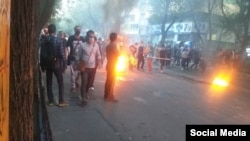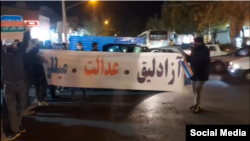As anti-government protests continue across Iran, "freedom, justice and national government" has become a common slogan on the streets of Tabriz, Urmia and Ardabil, the three largest Azerbaijani-Turkish population centers in northwestern Iran.
The demands quickly caught the attention of the country’s other non-Persian communities.
Protesters early this month chanted the popular slogan as well as "sovereignty for nations,” “freedom for women" and "the business of the mullahs: theft, murder and treason" in videos posted on social media showing protests in the Girkh-Metr and Shahnaz neighborhoods of Tabriz. The demonstrations marked 40 days since the death of a female protester in the custody of Iranian’s security forces.
Hadis Najafi, an ethnic Azerbaijani Turk, became a symbol of anti-government protests after she was shot and killed on September 21 in the central city of Karaj while taking part in demonstrations over the death of Mahsa Amini, who had been arrested by Iran’s morality police.
The slogans that are heard and sometimes appear on banners in northwestern Iran are mostly in the Azerbaijani-Turkish dialect common in the region, which like the neighboring country is called Azerbaijan.
After the establishment of the modern Iranian nation-state in 1925 by Reza Shah, Azerbaijani-Turkish was taught in schools very briefly during a short-lived autonomous "Azerbaijan National Government" in 1945-46. The term “national government” in the protest slogan is a reference to the period of Iranian Azerbaijan’s autonomy.
However, calls for national autonomy in Iranian Azerbaijan are considered divisive not only by the Iranian authorities but also among many members of dissident groups.
Iranian authorities and the state-run media present those who were detained in recent protests in northwestern Iran as separatists and backers of "pan-Turkism" – labels usually applied to Turkish-language rights activists in Iran.
Fars News, a semiofficial agency with ties to Iran’s Revolutionary Guards, reported on October 19 that pan-Turkism advocates along with individuals from monarchist, Kurdish, MEK (People's Mojahedin Organization of Iran) and Marxist groups were arrested during the protests that took place in the capital, Tehran.
In an interview with VOA, Mahsa Mehdili, an exiled political activist from Iran's West Azerbaijan province now living in Turkey, said that these slogans show that Azerbaijani Turks want to take part in anti-government protests with their own identity and demands.
"We can interpret these slogans in many ways. But the bottom line is that a people want to take their destinies into their own hands and manage their own material and spiritual wealth," Mehdili said. "In fact, cooperation between Iran's different ethnic communities including Turks, Kurds, Arabs, Balochs and Persians for common causes will be possible only by accepting and recognizing each other’s identities, characteristics and differences."
The "freedom, justice and national government" phrase has caught the attention of Iran's other Turkish-speaking communities. A group of Qashqai Turks were seen shouting the same slogan in videos taken at the funeral of Qashqai Turk author and community leader Esedullah Merdani Rahimi, held in Shiraz on October 24.
The slogan was first popularized during a gathering that took place in Tabriz on July 24, 2021, in solidarity with protests over water shortages in Iran's Arab-populated Khuzestan province.
According to Yousef Azizi Benitorof, an Iranian Arab writer and journalist, "freedom, justice and national government" is a manifesto that aims to create a federal system in Iran.
"People in Tabriz, Urmia, Ardabil and other cities in [the Iranian province of] Azerbaijan have been chanting 'freedom, justice and national government' since the peoples of Iran started their revolution on September 16," Benitorof wrote in a Facebook post, referring to the nationwide protests that erupted after Mahsa Amini’s death.
"This slogan is a rights manifesto of people of Azerbaijan," said Benitorof. "This manifesto aims to create a federal system for Iran and a federal government for the Turkish-populated region of Azerbaijan. By raising this slogan, the revolution of the Iranian peoples has taken a step forward."
The Turks are Iran's largest linguistic minority, residing primarily in Iranian Azerbaijan bordered by the nations of Azerbaijan and Turkey.
The government of Iran has never published official statistics on the population of the country's ethnic and linguistic groups. However, during his official visit to Turkey in January 2011, then-Iranian Foreign Minister Ali Akbar Salehi stated that 40 percent of Iranians speak Turkish.
"We speak almost the same language. Forty percent of the Iranians speak Turkish. This is a big link between Turkey and Iran," Salehi said in response to a journalist's question over Iran-Turkey bilateral relations.
Most Azerbaijani Turks are Shia Muslims, which is the official state religion of Iran, but they have long been barred from education in their native tongue.
This story originated in VOA’s Azerbaijan Service.






